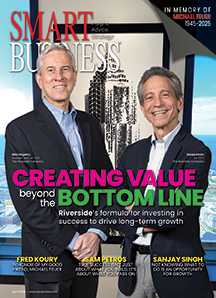If someone wants to read a book to improve his or her golf game, the person is likely to look up a title from a champion golf pro. When it comes to overcoming adversity, authors J. Barry Griswell and Bob Jennings are the voices of authority. Griswell, in particular, forged ahead despite numerous personal and professional setbacks. His years of tireless effort earned him the Horatio Alger Award, which is given to individuals who attain success despite a difficult background. Griswell teamed up with friend and co-author Bob Jennings to pen “The Adversity Paradox: An Unconventional Guide to Achieving Uncommon Business Success.” The pair offered insights to Smart Business on how to turn rough seas into smooth sailing.
You discuss components of human capital in the book; can you explain the importance of introspection?
J. Barry Griswell: In the book, we talk about five human capital components, and without question, the most important and the one that contributes to the others most is introspection. It’s that ability to look deep inside yourself and to look at the situation and make something out of it and to find out why things have happened and what you can do to move forward. Introspection is really the alchemy that helps you make a bad situation into something good, and it’s really a key to befriending adversity.
Bob Jennings: Certainly, in the business world, companies have evaluation processes, but they are, at best, one mirror. The mirror is your most important tool for doing introspection. You really need to have a lot of those so you can triangulate where you are, where you’re going and how fast you’re getting there.
This book references dealing with adversity through the concept of ‘And then some.’ How will that help in a difficult environment?
BG: I think it’s incumbent on all of us to take a positive view. When you have adversity come at you, you have two choices: You can wallow in it (and) be a pessimist. You can go off and hide for months, not accepting the reality of it. Quite frankly, some people do that. However, the real way to handle adversity is to do it with a positive attitude, accept responsibility for what component you might have had in the problem, (and) then move on and take action. Do that action with ‘And then some.’ I think we’re coming to grips as a country with the adversity that we face right now.
What about those individuals who can’t stop looking in the rearview mirror at past difficulties?
BG: One reality we have to keep in mind: Out of every adversity comes opportunity. In many ways, these opportunities will not present themselves unless there is adversity first. People need to get used to [examining] adversity when it comes. What are the opportunities? What are the positives? Stop looking back. Looking back at the way things used to be will actually inhibit you from finding those opportunities.
Why is now the perfect time to embrace adversity and grab opportunity by the throat?
BG: Humankind, business and individuals cannot reach their potential without going through difficult times. I think what we’re faced with right now is a godsend. We had excesses in the system. We were consuming too much. We weren’t saving enough. We were taking too much risk. We didn’t have the right regulations. People were operating under greed. All of those things had to come under control, and I don’t think they would have come under control incrementally. I think a big bang needed to happen to get people’s attention. We’re going to be better off as a result of going through this. A lot of opportunities are going to be found.

